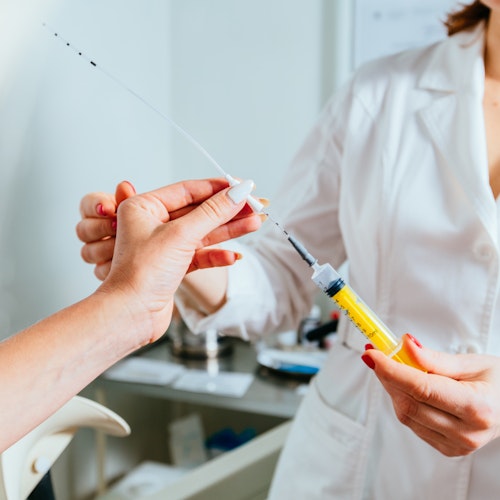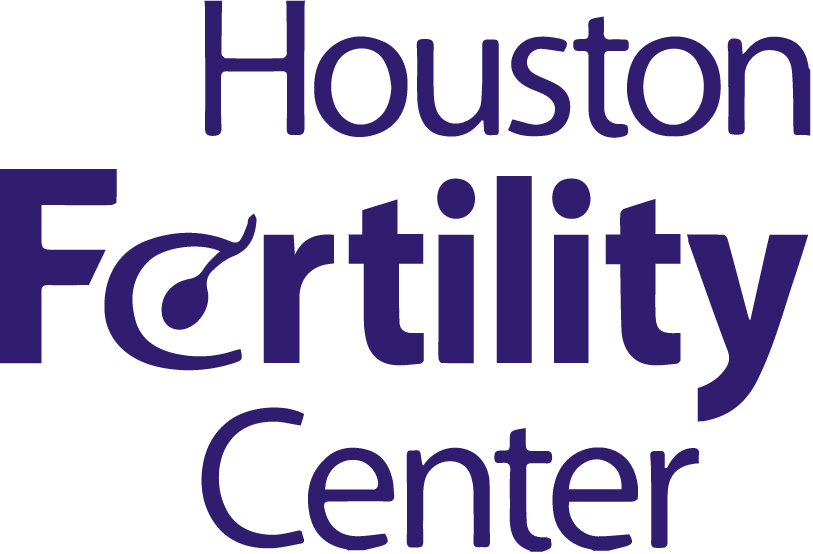Endometriosis Treatment in Houston, TX
Endometriosis can result in both physical and emotional pain, and mean difficulty conceiving.
Fortunately, the symptoms of endometriosis can often be managed, and patients who wish to conceive have options. Houston Fertility Center can provide endometriosis treatment in Houston, TX, so your dreams of becoming a parent can become a reality.
What Is Endometriosis?

Endometriosis is a painful condition in which the inner lining of the uterus grows outside the uterus. The tissue looks and acts like endometrial tissue, and can spread to your ovaries, fallopian tubes, and pelvis, irritating the structures it touches.
In a healthy uterus, the uterine tissue thickens throughout the menstrual cycle and then breaks down and exits during menstruation. When tissue develops outside the uterus, it can't be shed monthly through menstruation, causing uncomfortable symptoms.
In the United States, an estimated 2% to 10% of women ages 25 to 40 are affected by endometriosis. The condition typically develops several years after beginning menstruation, but the symptoms can be debilitating for people of all ages.
The Symptoms of Endometriosis
The most common side effects of endometriosis occur during the menstrual cycle and can include:
- Nausea
- Vomiting
- Fatigue
- Constipation
- Diarrhea
- Bloating
- Pelvic pain
Other symptoms associated with endometriosis include:
- Painful periods
- Abnormal or heavy periods
- Intermittent bleeding between periods
- Pain when urinating
- Pain during bowel movements
- Pain during intercourse
- Infertility
The symptoms of endometriosis may temporarily improve during pregnancy and may go away completely once a patient reaches menopause, unless the patient is taking estrogen. If you are experiencing debilitating symptoms of endometriosis, treatment is available.
Fertility Care for Endometriosis Patients
What Causes Endometriosis?
The exact cause of endometriosis has not been proven. However, there are certain theories about what may cause the condition. Some of these theories include:
Retrograde Menstruation
This occurs when menstrual blood flows back into the fallopian tubes. Instead of exiting the body, this blood containing endometrial cells goes into the pelvic cavity.
Surgical Scar Implantation
Some doctors believe that endometrial cells may attach to the surgical incision following a hysterectomy, C-section, or other surgery.
Immune System Disorder
In some cases, doctors believe immune system disorders may leave the body unable to recognize and destroy endometrial tissues that grow outside of the uterus.
Other Causes
Other potential causes include embryonic cell transformation, transformation of peritoneal cells, and endometrial cell transport.
Endometriosis Treatment Can Improve Your Fertility
The American Board of Obstetrics and Gynecology recommends that patients seek advanced infertility treatments from someone who is board certified in Reproductive Endocrinology and Infertility (REI), like Dr. Sonja Kristiansen. Our doctor has treatment options for patients who wish to manage the symptoms of endometriosis, as well as options for patients who want to become pregnant. She can help prevent complications and improve your chances of having a safe pregnancy and smooth delivery.
Safe and effective endometriosis treatment is available at our Houston, TX, practice. To explore your options, reach out to us by completing this form or calling:

“I can't thank them enough for helping us build our family…” Reviews of Our Houston Practice
I love this place the nurses definitely put alot of definition into this clinic. Without them and their kindness I probably wouldn't have made it mentally. Anytime I had a question they answered whether through phone call or email. It was the best!
View on Google
Best Fertility clinic, they are caring and love what they do. I did 4 rounds of IVF 3 being successful. And we did 1 round with a surrogate and we got twins. Blanca, Mayra and Melissa are the sweetest and love what they do. Dr. K is such a great doctor. I can't thank them enough for helping us build our family, we are so grateful for what they do.I would highly recommend if you are trying to start a family.
View on GoogleDiagnosing Endometriosis
Because the symptoms of endometriosis can be nonexistent or mistaken for other conditions, such as IBS (irritable bowel syndrome), ovarian cysts, uterine fibroids, or pelvic inflammatory disease (PID), it is often misdiagnosed.
To get an accurate diagnosis you should:
Discuss Your Symptoms
When meeting with your gynecologist during routine exams, it is important to review any symptoms you may be experiencing to ensure a proper diagnosis. Your gynecologist may refer you to a specialist like Dr. Kristiansen in Houston if they believe you may have endometriosis.
Undergo Transvaginal Ultrasound
If Dr. Kristiansen suspects endometriosis, she will perform a transvaginal ultrasound to view the inside of your uterus and ovaries. During testing, Dr. Kristiansen will insert a small device called a transducer into your vagina. This tool uses high-frequency soundwave technology to capture images and display them on a nearby computer screen. These scans can be used to identify any uterine fibroids and ovarian cysts causing complications.
Receive Laparoscopy Evaluation
If further testing is required, our Houston doctor may recommend an advanced laparoscopy evaluation. This procedure involves the use of a special camera inserted through a small abdominal incision, which will allow her to determine the location, size, and extent of the endometrial growth. Removal of the endometrial tissue can sometimes occur during this procedure.
Understanding the Stages of Endometriosis
The American Society of Reproductive Medicine has outlined four stages of endometriosis, depending on the spread of the endometrial-type tissue, its depth, and the areas that are being affected. Depending on your stage, your treatment options may be different. Your condition can be ranked as follows:
Endometriosis isn't always a progressive condition that moves from one stage to the next. Additionally, some patients may stay in one stage, even if they don't seek treatment.
“I rate this clinic excellent and 100%. I recommend Dr. Kristiansen and her team, they are professionals, thanks to their help, we enjoy life with our little princess.” Eva Novo
Why Endometriosis Causes Infertility
Though it's not completely understood how endometriosis causes infertility, doctors have come up with a few hypotheses. They believe endometriosis can lead to a variety of conditions that can cause infertility, such as:
- Distorted pelvis
- Adhesions
- Scarred or obstructed fallopian tubes
- Inflammation
- Altered egg quality
- Damaged sperm or eggs
- Impaired implantation
You're Not Alone

Conceiving With Endometriosis
If you have endometriosis, conceiving may be more difficult, but you have options that can improve your chances of getting pregnant. Dr. Sonja Kristiansen in Houston, TX, can allow you to explore these options and make your dreams of being a parent a reality.
If you're ready to explore assisted fertility options, we invite you to reach out to us by filling out our contact form or calling:
(713) 862-6181
“I love this place and Dr. K has a high success rate. This is why I initially went to her clinic. They don’t treat you like a business but it’s very personal. I was successful on my first IVF attempt and had a healthy baby girl. I will be using her for my next baby when I’m able. Highly recommended.”
Vicky Montenegro
Assisted Fertility Options
Assisted fertility options are available to patients in Houston, TX, and beyond who are struggling with infertility.
Intrauterine Insemination (IUI)

During this procedure, sperm are placed directly into the uterus at the time of ovulation. IUI is usually the first assisted fertility option endometriosis patients try because it is less invasive.
In Vitro Fertilization (IVF)

IVF is a procedure in which eggs are removed from the ovaries and fertilized in a lab. An embryo is then transferred into the uterus. If you have severe endometriosis, you may benefit from IVF.

What About Surrogacy?
For many patients, the goal is to conceive and carry a pregnancy. However, sometimes that goal proves out of reach, or it is simply not the best course of action for a patient. In these cases, gestational surrogacy can be a great way for patients to have a biological child of their own.
During gestational surrogacy, eggs are retrieved from the intended mother and fertilized with sperm from the intended father. The resulting embryo or embryos are then transferred to the gestational carrier (surrogate's) uterus, where the embryo is given the opportunity to grow. The surrogate will continue the pregnancy and deliver the baby.
The baby is biologically related to the intended mother and father, unless donor eggs and sperm are used. In gestational surrogacy the baby is in no way related to the surrogate. Traditional surrogacy (where the surrogate has a biological link to the baby) is also an option; however, most patients opt for gestational surrogacy as there are fewer legal restrictions.
While we understand surrogacy may not be your first choice, Dr. Kristiansen may suggest surrogacy if other reproductive methods have failed or if you have other concerns that may hinder conception or make pregnancy unsafe for the mother. During your consultation, Dr. Kristiansen can discuss all your options.
Our Treatment Options for Endometriosis in Houston
Treatment for endometriosis at our Houston clinic depends on the severity of your condition and whether you wish to become pregnant. Doctors typically recommend more conservative methods first, but may resort to surgical methods if treatment fails. Your treatment options include:

Pain Medication
Over-the-counter pain medication taken during the menstrual cycle may be enough to alleviate the symptoms associated with mild endometriosis, like pelvic pain. This may be used in combination with hormone therapy like birth control in patients who aren't trying to get pregnant.

Birth Control
Endometriosis requires estrogen to develop. Birth control pills, patches, intrauterine devices, and vaginal rings that lower or block estrogen can help manage the condition.

Gonadotropin-Releasing Hormones (GnRH)
GnRH therapy can lower estrogen levels and prevent menstruation, causing endometrial tissue to shrink. It can also reduce pelvic discomfort.

Surgery
A doctor can remove endometrial tissue while preserving your uterus and ovaries to alleviate your symptoms and increase your chances of conceiving if you have mild to moderate endometriosis. Most surgical procedures can be performed by laparoscopy, during which our doctor will make small incisions in the abdomen to insert a laparoscope, a viewing instrument. Our doctor can then remove endometrial tissue through the incisions.

Hysterectomy
The removal of the uterus (hysterectomy) and sometimes the cervix, fallopian tubes, and ovaries (oophorectomy) won't completely cure endometriosis, but it can alleviate the symptoms. This method is used as a last resort.
Treatment is highly individualized for each patient, and a combination of treatments may be used. Requesting a consultation with Dr. Kristiansen in Houston will allow you to explore your options.
Isn't Surgery the Best Option?
Not necessarily. Even laparoscopy involves some recovery time and risk, despite being less invasive than traditional open surgery. Surgery also is not a guarantee that your endometriosis will be cured. In some cases, a small number of patients have experienced a reoccurrence of their endometriosis even after surgery. During your consultation, we will discuss your options in order to develop a custom treatment plan to give you the best possible chance at relieving your symptoms.
Dr. Sonja Kristiansen is board-certified in Reproductive Endocrinology and Infertility. Our doctor has treatment options for patients who wish to manage the symptoms of endometriosis, as well as options for patients who want to become pregnant.
Get the Help You Need to Relieve Your Pain Call us today.
Endometriosis can be painful, not just during your period, but during other times in your cycle. It can also make intercourse and bowel movements painful. We are here to help. Our fertility clinic in Houston, TX, helps patients achieve their dreams of expanding their families by getting to the root cause of their fertility struggles. Diagnosing and treating endometriosis can mean relief from your pain and a better chance of becoming pregnant.
We offer comprehensive treatment options. Dr. Kristiansen knows that each patient is different, and treatment is highly individualized for each patient. This may mean a combination of treatments may be used in order to address your unique situation.
Get started today and explore your options by requesting a consultation with Dr. Kristiansen at our Houston fertility clinic. Use our online form or give us a call.
(713) 862-6181
Risk Factors for Endometriosis
Some factors may increase your chances of developing endometriosis, such as:
- Starting your period at an early age
- Having a first-degree relative with endometriosis
- Having a low BMI
- Having short menstrual cycles
- Having heavy periods that last longer than seven days
- Having higher levels of estrogen
- Never giving birth
- Going through menopause at an older age
- Certain medical conditions
Frequently Asked Questions About Endometriosis Treatment in Houston
I have heard that pregnancy will cure endometriosis. Is that true?
Unfortunately, pregnancy does not cure endometriosis. However, it can sometimes improve symptoms because pregnancy temporarily stops menstruation and ovulation and causes changes in hormone levels. Some patients find they have decreased symptoms following pregnancy. However, pregnancy is not a guarantee your symptoms will improve long-term.
I have been pregnant before. Can I still have endometriosis?
Yes. It is entirely possible to have endometriosis even though you have been pregnant before. Endometriosis affects women differently. Some women with endometriosis may struggle to conceive or maintain a pregnancy, while others may not have fertility issues at all. It is also not uncommon for women with endometriosis who have been pregnant before to later struggle to conceive. We look at the big picture when diagnosing and treating endometriosis.
I had surgery to treat my endometriosis, but it has come back, and I am struggling to conceive. Can you still help me?
Yes. If your endometriosis symptoms have returned, our skilled fertility experts can evaluate you and determine a course of treatment to help alleviate your symptoms and help you build your family.
Have other questions about endometriosis or are you ready to speak with our fertility experts?
“We definitely recommend Houston Fertility Center.” Why Houston Turns to Us
From the very first phone call the staff was very patient and informative. I was given so much to work with and didn't feel rushed. All of my follow-up questions were answered as well. I will update my review over time.
View on this site
Dr. Kristiansen and all the staff are great. We went in for a IVF consultation and due to the way they treated us and made us feel we decided to begin the process as soon as we were able to. We will always be thankful to Dr. Kristiansen, Blanca, Melissa and especially Mayra they are all amazing, they helped us with our thousand questions and doubts and when we felt discouraged they kept our spirits up. Thanks to them we are now expecting our precious baby girl. We definitely recommend Houston Fertility Center.
View on Google



